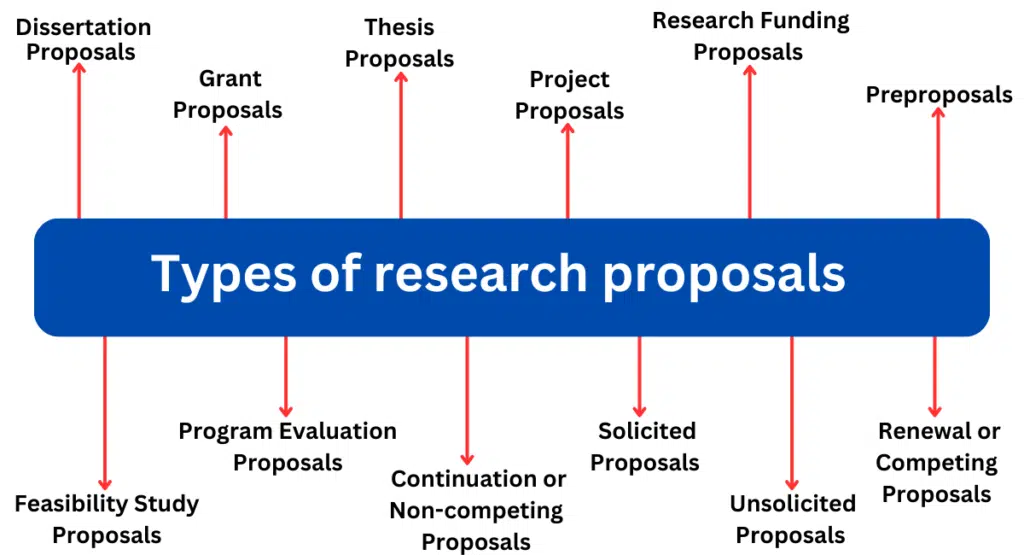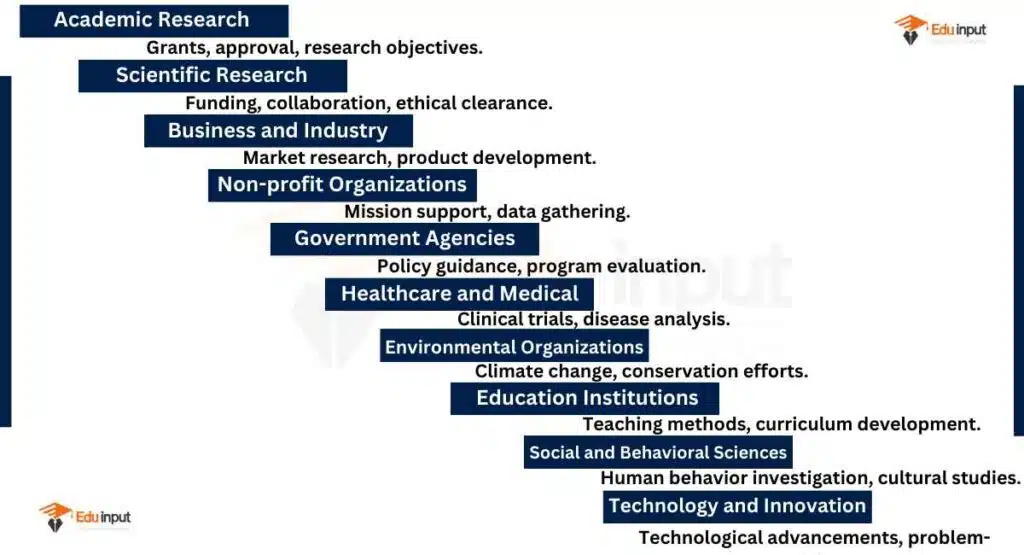Research Proposal-Components, Types, Topics, Importance, and Applications
What is Research Proposal?
A research proposal is a document that outlines the plan and rationale for conducting a research study. It serves as a blueprint for the entire research process and helps researchers communicate their objectives, methods, and expected outcomes effectively.
Components of a Research Proposal
The key components of a research proposal include:
- Title (Concise and informative title that reflects the essence of the research study)
- Abstract (Brief summary of the research proposal, highlighting its key objectives, methods, and expected outcomes)
- Introduction (Overview of the research topic, highlighting its significance and relevance)
- Research Objectives/Questions/Hypotheses (Clear and specific statements that outline the purpose of the study)
- Literature Review (Critical analysis of existing scholarly works related to the research topic)
- Research Methodology (Detailed explanation of the research design, data collection methods, and analysis techniques)
- Significance and Expected Outcomes (Explanation of the potential impact of the research and the expected results)
- Research Timeline (Proposed timeline that outlines the key milestones and activities of the research study)
- References (Comprehensive list of the sources cited in the research proposal)
Also learn about Action Proposal
Types of Research Proposals
Research proposals can vary depending on the field of study and the intended audience. Different types of research proposals can help you determine which format is most appropriate for your specific needs.
Whether responding to a solicitation, submitting an unsolicited proposal, or seeking continuation or renewal funding, each proposal type requires careful consideration and alignment with the sponsor’s objectives and guidelines.
Here are some common types of research proposals:

1. Solicited Proposals
Solicited proposals are submitted in response to a specific call or request issued by a sponsor. These calls, often referred to as Request for Proposals (RFP) or Request for Quotations (RFQ), outline the sponsor’s specific requirements, objectives, and evaluation criteria.
Solicited proposals must adhere to the provided guidelines and may include technical specifications and terms and conditions set by the sponsor. Broad Agency Announcements (BAAs) are similar but are not considered formal solicitations.
2. Unsolicited Proposals
Unsolicited proposals are submitted to a sponsor without a specific request or solicitation. In these cases, the investigator believes that the sponsor has an interest in the subject matter. Unsolicited proposals require the researcher to present a compelling case for the significance and relevance of their research, convincing the sponsor of the value and potential impact of the proposed study.
3. Preproposals
Preproposals are typically requested by sponsors who want to streamline the application process and minimize the effort required by applicants. Preproposals are in the form of a letter of intent or a brief abstract that outlines the main objectives and approach of the research.
After reviewing the preproposal, the sponsor informs the investigator if a full proposal is warranted. This process allows both the investigator and the sponsor to determine if it is worthwhile to proceed with a complete proposal submission.
4. Continuation or Non-competing Proposals
Continuation or non-competing proposals are submitted for multi-year projects that have already received funding from the sponsor for an initial period, typically one year. These proposals confirm the original proposal’s scope, objectives, and funding requirements for the subsequent period.
The sponsor’s decision to continue funding is contingent upon satisfactory work progress and the availability of funds.
5. Renewal or Competing Proposals
Renewal or competing proposals are submitted when an existing project is nearing its end, and the investigator requests continued support for the research. From the sponsor’s perspective, these proposals are treated similarly to unsolicited proposals, requiring a thorough presentation of the project’s achievements, impact, and future plans.
Renewal proposals must demonstrate the ongoing relevance and value of the research, highlighting the need for further funding to continue the project’s objectives.
6. Grant Proposals
Grant proposals are submitted to funding agencies, such as government bodies, foundations, or organizations, to secure financial support for research projects.
These proposals typically require a detailed description of the research project, including the objectives, methodology, expected outcomes, budget, and timeline. Grant proposals often follow specific guidelines provided by the funding agency.
7. Dissertation Proposals
Dissertation proposals are submitted by doctoral students as part of their research journey. These proposals outline the research topic, objectives, theoretical framework, methodology, and anticipated contributions to the field.
Dissertation proposals also typically include a literature review to establish the context and significance of the proposed research.
8. Project Proposals
Project proposals are common in academic and professional settings where research projects are undertaken. These proposals outline the objectives, scope, methodology, timeline, and expected outcomes of the project.
Project proposals often include details about the project team, resources required, and the potential impact of the project on stakeholders.
9. Thesis Proposals
Similar to dissertation proposals, thesis proposals are submitted by students pursuing a master’s degree. These proposals present the research topic, objectives, methodology, and expected contributions to the field.
Thesis proposals also include a literature review that highlights the existing knowledge and research gaps in the chosen area of study.
10. Research Funding Proposals
Research funding proposals are typically submitted by researchers or research teams within academic institutions or research organizations. These proposals aim to secure funding for ongoing or new research projects.
Research funding proposals often include a detailed description of the research objectives, methodology, expected outcomes, budget, and timeline. They may also require a justification for the need for funding and a demonstration of the potential impact of the research.
11. Feasibility Study Proposals
Feasibility study proposals are used to assess the practicality and viability of a research project before its full implementation. These proposals outline the research objectives, methodology, timeline, and expected outcomes, with a particular focus on evaluating the feasibility of conducting the research.
Feasibility study proposals often involve preliminary data collection or analysis to inform the decision-making process.
12. Program Evaluation Proposals
Program evaluation proposals are designed to assess the effectiveness, efficiency, and impact of a specific program, intervention, or policy. These proposals typically outline the evaluation objectives, methodology, data collection methods, analysis techniques, and expected outcomes.
Program evaluation proposals often require collaboration with relevant stakeholders and may involve both qualitative and quantitative research methods.
Steps in Developing a Research Proposal
Following steps are involved in Developing a Research Proposal:
- First of all identify a research topic. Select a research topic that aligns with your interests, expertise, and the existing gaps in knowledge.
- Review existing literature. Conduct a comprehensive literature review to understand the current state of knowledge in your research area and identify research gaps.
- Formulate research objectives/questions/hypotheses. Clearly define the research objectives, questions, or hypotheses that you aim to address in your study.
- Design research methodology. Determine the most appropriate research design, data collection methods, and analysis techniques for your study.
- Develop a research timeline. Create a timeline that outlines the key activities and milestones of your research project, ensuring a realistic and achievable plan.
- Consider ethical considerations and research limitations. Address any ethical concerns associated with your research, such as participant consent and data privacy. Also, acknowledge the potential limitations of your study.
- Write the research proposal. Compile all the components of the research proposal into a cohesive document, ensuring clarity, coherence, and adherence to guidelines.
Selecting Research Proposal Topics
Selecting a suitable research topic is important for the success of your research proposal. Consider the following tips when choosing your research topic:
- Choose an interesting topic. Select a research area aligned with your passions, experiences, or career aspirations to stay engaged and motivated throughout the process.
- Narrow down your topic. Refine your research question to a specific aspect or subtopic to maintain focus and avoid overwhelming amounts of information.
- Familiarize yourself with existing literature to gain insights, identify gaps in knowledge, and refine the scope of your research.
- Tailor your topic selection to meet the specific requirements and expectations outlined in your research assignment.
- Consult with professors or TAs for guidance, insights, and recommendations related to potential research topics within your field of study.
- Discuss your research ideas with classmates or friends to gain different perspectives, identify new angles, and prompt innovative approaches to your topic.
- Consider the “who, what, when, where, and why” questions.
- Why did you choose the topic? What aspects of the topic interest you? Do you have a particular opinion or stance on the issues involved?
- Who are the key information providers on this topic? Are there specific organizations, institutions, or experts affiliated with the topic?
- What are the major questions, debates, or issues surrounding the topic? Are there different viewpoints or perspectives to consider?
- Where is your topic significant? Does it have local, national, or international implications? Are there specific geographical regions or communities affected by the topic?
- When is/was your topic important? Is it a current event or a historical issue? Are you interested in comparing your topic across different time periods?
Examples of Research Proposal Topics
- The impact of social media on mental health among adolescents
- Exploring the effectiveness of mindfulness-based interventions in reducing stress and anxiety
- Investigating the factors influencing consumer buying behavior in the e-commerce industry
- Assessing the effects of climate change on agricultural productivity in developing countries
- Investigating the Relationship between Exercise and Cognitive Function in Older Adults: A Randomized Controlled Trial.
- Exploring the Role of Artificial Intelligence in Enhancing Customer Experience in the Retail Industry.
- Understanding the Factors Influencing Employee Job Satisfaction and Engagement in the Workplace.
- Examining the Impact of Online Learning on Student Performance and Satisfaction in Higher Education.
- Investigating the Relationship between Parental Involvement and Academic Achievement among Elementary School Students.
- Analyzing the Effects of Early Childhood Education Programs on Long-term Academic Success and Socioeconomic Outcomes.
- Exploring the Factors Influencing Consumer Decision-making in Purchasing Organic Food Products.
- Investigating the Effects of Workplace Diversity on Organizational Performance and Innovation.
Importance and Impact of a Well-Written Research Proposal
Crafting a well-structured and compelling research proposal is essential for several reasons:
- A well-developed research proposal increases your chances of securing funding from organizations and institutions.
- Research proposals are often required for academic programs and can contribute to your academic and professional growth.
- A well-crafted research proposal provides a clear direction and plan for your research study, minimizing ambiguity and ensuring focused efforts.
- A thorough research proposal increases the likelihood of conducting impactful research that contributes to knowledge and addresses real-world problems.
Applications of Research Proposals
Research proposals serve as essential tools for planning and initiating research projects across various fields. They play a crucial role in academic, scientific, and professional settings. Here are some key applications of research proposals:

- In academic research, Research proposals are commonly used in academia to secure grants, scholarships, or to gain approval for research projects.
- Scientific Researchers in various scientific fields use research proposals to obtain funding, collaboration, and ethical clearance.
- In Business and industry, Research proposals are essential in business settings for conducting market research, product development, and process improvement initiatives.
- Research proposals enable non-profit organizations to gather data and evidence to support their mission and programs.
- Research proposals help government agencies gather information for policy development, program evaluation, and decision-making.
- Research proposals are used in healthcare settings to conduct clinical trials, study disease patterns, and evaluate treatment interventions.
- Research proposals assist environmental organizations in studying and addressing environmental issues such as climate change, pollution, and conservation.
- Research proposals are employed in educational settings to study teaching methodologies, curriculum development, and student outcomes.
- Research proposals are utilized in disciplines such as psychology, sociology, and anthropology to investigate human behavior, social phenomena, and cultural practices.
- In Technology and innovation, Research proposals support technological advancements by exploring new technologies, improving existing systems, and solving technological challenges.



Leave a Reply